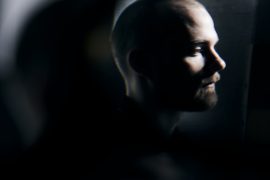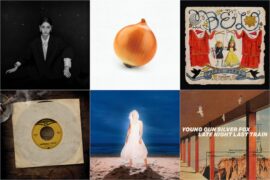British duo Seafret’s sophomore album ‘Most of Us Are Strangers’ helps us feel in good company, while so very far apart.
Stream: “Most of Us Are Strangers” – Seafret
Jack Sedman is the singer and ginger topped member of British folk rock duo, Seafret. Together with his friend and guitarist Harry Draper, Seafret had recently been on tour promoting their latest album Most of Us Are Strangers until the coronavirus took our planet by storm. As a result of the worldwide COVID-19 pandemic, Sedman had a bit of time to spend speaking to Atwood Magazine. Though this conversation only took place a week or so ago, it seems like we’ve all been through a lot of life since then.

Way back then (last week), the idea of wearing a mask and gloves in social situations seemed a bit hyper. Nowadays, it’s not only expected, but it’s also become fashion. In those olden days, going to a pub was normal enough, while in our present world, it could be deadly if it wasn’t impossible. And yet, that’s exactly where we caught up with our ginger crooner, the star of this interview, the day before we all sheltered-in-place. In trying not to focus on the science fiction thriller our lives were becoming, Sedman and I discussed Seafret’s new album Most of Us Are Strangers, his writing style, best hair tips, and his latest hoodie obsession. And as far as we got from the deep darkness of current events, Seafret’s album Most of Us Are Strangers, with lyrics like:
Most of us are strangers who want someone to save us
We’re looking out for angels and something we can hold on
We hear sirens and suffer in the silence
Getting tired of trying and tired of being alone, oh
is topically exactly what we all need to hear, to feel in good company, while quarantined, and so very far apart.
In premiering Seafret’s 2018 Monsters EP, Atwood Magazine praised the band for “shin[ing] a light on the ugly stuff, leaning into personal insecurity and self-doubt, heartache and loss, pain, and more – not necessarily in order to assuage or ameliorate, but rather to observe and reflect on real truths often considered ‘taboo’ by media and the general populace.” That streak continues on their new album, which hits so hard in present times.
Dive into our interview with Seafret below, and listen to Most of Us Are Strangers, out now!
— —
:: stream/purchase Seafret here ::
Stream: ‘Most of Us Are Strangers’ – Seafret
A CONVERSATION WITH SEAFRET
Atwood Magazine: How are you doing in this nutty world?
Jack Sedman: I’m good, yeah…
That’s good. Where are you?
Sedman: I’m in England at the minute. I’m in East Yorkshire – where I grew up. It’s nice to be back.
You grew up by the sea right?
Sedman: In a place called Bridlington.
So you’re enjoying the nice fresh air?
Sedman: Oh, it’s beautiful.
How is everybody handling the coronavirus pandemic?
Sedman: Oh god yeah it’s everywhere. As of 12 o’clock this evening all the pubs and restaurants will be shut.
Yeah, they did that here about two days ago.
Sedman: Schools have shut down… I would like to think of this as a safe place as opposed to a place that’s super busy. But it still seems to be everywhere. I don’t think there’s a place where you can escape it at the minute. It’s super serious.
It’s just nuts. How has the this pandemic affected your life? I can hear that you’re outside right now… Right?
Sedman: Yeah, sorry there’s a road nearby. And my phone isn’t the best.
You don’t have to apologize to me! It’s actually really refreshing because I haven’t left my house in… Wow, weeks…
Sedman: Oh so it’s nostalgic!

So let the buses pass you and let the birds chirp!
Sedman: We’ve been trying to practice social distancing. It is best. If we can prevent spreading this virus in anyway that’s what we’ll do. See, I have my grandparents and my parents here, and we are super family oriented. I just got back and they want me to come over and tell them all about it (Seafret’s recent tour)… but I am nervous about it so, well basically I just came out for a pint before all the pubs shut…
Oh my gosh, a pub, I wish. That sounds amazing.
Sedman: You might never be able to come again… you never know!
Please don’t say that! This is going to pass.
Sedman: You never know…
When you’re in a state of isolation, is that good for your creative process? Or is it hard on you?
Sedman: Um. Well it’s so fresh right now. I don’t know at the minute. I came back and then got home and usually we end a tour with a party. But we got cut short a few shows. We were in Brighton and then it was just over. It was over before the Brighton show even happened. We were meant to go to London and Dublin. It was a very abrupt ending to such a great time that we had. By the time I got back, everyone was locked in.
We spent the tour trying to blank it out. Trying to enjoy it (the tour) and give people the shows that they deserved, that they paid for. Not talk about the virus too much in between songs. I didn’t want to mention it. (I wanted) to take peoples minds off of this virus.
I know, I thought about that with this interview too. But honestly I can’t not mention it.
Sedman: No no no it’s true, it’s everywhere now, we can’t not touch on it. But the tour itself was fantastic.
So where was the last show you played?
Sedman: We were in Exeter before Brighton. A small show really. Like, one of the smallest shows of the tour. But I think only 90 people did not turn up.
So how many people in total were there?
Sedman: I think there’s probably about 400 or 500 people, So it wasn’t too bad
I feel so proud of you guys. I mean, I am just meeting you now, but I’ve been listening to Seafret for a very long time and it’s awesome that you guys are so successful. You really deserve it.
Sedman: Well that’s so sweet, thank you. We enjoy it, we love it.

So, after listening to your extremely empathetic and insightful lyrics, I’m assuming that being around other people is a source of inspiration for you.
Sedman: Yeah, I mean, I write in both situations. There’s kind of a process to writing. I think you have to digest life before writing about it. I’m not the kind of person that will go through a break up, or lose a family member, and then that day I’m writing about it. I think the brain kind of takes a long time, or maybe just my slow brain, ha. It’s usually about six months down the line usually when it’s kind of cleared out of my brain that I can finally start writing about it. So even sometimes I’ll start to work out something and I’ll be like what is this about? Because I’ve been in such a good place in my life. I think I write when I tend to be a little happier, and then sometimes upset stuff comes out and I think, maybe that’s just my way of processing life, and using it as kind of an outlet to get get rid of that stuff. I do get rid of a lot of emotions through writing and things like that.
So you feel like once you’ve written about something you can kind of close the door on it?
Sedman: Yes. It’s a strange thing to describe because at the time, I don’t know what I’m writing about really. I just know that it effects me. When I’m writing ideas down, I can feel those parts of the lyric. Just writing the lyrics alone will get me, will help me. I’ll be working on music and building a track up but, I’m not aiming to slay everyone with tears hahaha.
But you do!
Sedman: It does seem to be a power that I do have ha ha ha ha.
Yes, you do! Is it still the case that Harry writes the music first and then you add lyrics?
Sedman: Yeah. We set it up strictly that way.
(audible: seagulls flying overhead)
Birdies!
Sedman: Hahaha, yeah… seagulls.
Squeal! Sorry... I am Ilana in captivity right now. It’s so nice to hear seagulls … you were saying…
Sedman: They’re singing for you! Yeah so, when we started out, Harry strictly wrote the music because I dropped music in my ninth year of school. I had no interest in it. It was always my dad’s thing. He was in punk bands and things like that.
Nice!
Sedman: So, I used to go watch him. But it was nothing really … It had nothing to do with my life at the time. It was always his side of it. So Harry would come up with his guitar parts… See, we met when I was forced to go to this open mic night with my dad’s guitarist. It was like, my mom had heard me sing in the bathtub, So they were like “he can sing”…
Hahahahaha!
Sedman: Then I ended up going to this open mic night and I met Harry there. The first ever time I had sung in front of people. It was candlelit, red curtains behind me, no microphone, I was an absolute wreck.
That’s like a scene from a movie.
Sedman: Yeah, haha. Then I met Harry. Harry was playing the banjo, probably about 16. He was, at the time, playing in his dad’s Americana bluegrass band. His dad suggested that we play together and I started going up to his house after that. I was so nervous.
It’s so funny because, I mean, I don’t know Harry but, when I look at him, he seems like such a sweet person. Not someone to be nervous about. I guess you were nervous about performing in front of new people.
Sedman: Harry is lovely. He’s always been genuinely lovely, loving and a very good friend. Very loyal and honest and I think I need that in order to be so open with writing lyrics and stuff.
It’s clear that you trust him. The lyrics that you write are always so personal. I feel like I have lived through very many similar situations to those about which you write. It makes sense that you would have to feel comfortable with your musical partner in order to express these ideas.
Sedman: My dad always tells me, “If you watch anybody perform live, you’ll know if they actually believe in what they’re singing and if they’ve actually been through it.“ I took a big lesson from all of that In my songwriting. So I always write about things that make me feel something that I know and it’s coming from a real place in me. That I can portray when I’m playing it live. That I can dig in and actually give it real emotion. I think people pick up on that.
Definitely. Some of the songs that you sing are so observational too. It sounds like things you’ve noticed about other people around you.
Sedman: Yes sometimes it’s that. And sometimes the same scenarios that I have observed, are things that I’ve been through. If you’ve gone through situations that are actually quite heavy, writing it down seems almost impossible because you wouldn’t know where to start. So, I take that picture and channel it to someone else that I care about. It sounds horrible, but for me… it helps. The top of my family is my moms mom and dad: my gran and granddad.They’re kind of like the rock of the family. If I were to link things to them, I really find myself able to write lyrics that emote because I really do love and care about them so much. And I seem to be able to put my own stuff through them.
It’s a good trick.
Sedman: It allows me to not over think, over worry. Because, can you imagine putting your own feelings safely out there… It’s a bit like writing a diary actually, isn’t it? I’ve got to trick my brain into thinking, it’s not me it’s them.
So when you write a song for someone. Let’s say, you write a song about someone you just broke up with or someone you’re in love with, whatever the subject is, do you tell them about it or let them figure it out on their own?
Sedman: I’ve never gone “Here, this song is for you.“ I think it’s cheesy. I’d probably get dumped anyway.
No you would not!
Sedman: I think anything can happen. So if you attach a song to someone… It’s like Bob Dylan and his girlfriend. He sang all of these songs for her and then one day they split up and he said, I can’t play them anymore… and they were all brilliant.
It is a risk.
Sedman: I’ve certainly never gone to social media and said this is all about this person.
Yeah, don’t do that. You might actually get dumped if you do that! So, in terms of the emotions that drive you to write, how important is happiness to you? Are you inspired equally by dark emotions and light emotions?
Sedman: In life, I’m a totally happy person. Like, super upbeat positive, no coronavirus conversation, that kind a guy. In songs, it seems I channel out the darker side of things. I consider myself quite strong. Even though a lot of my songs seem quite vulnerable. Not to sound arrogant or anything like that, but I’ve always felt that way. I’ve played bars and other small venues like parties and things like that. I’ve had friends and people take the mick and say, “Why do you sing like that? You should sing like this.” Or “you need to grow a pair“ Ha…to me, it’s a brave guy who can stand and sing honest stuff instead of stuff he thinks other people want to hear.
I agree with you 100%.
Sedman: It has to be real to me. Otherwise, you won’t enjoy it. I think for the people that are following us, it has to be real to them as well.They are very up on it.
For sure. I mean Seafret fans and singer-songwriter fans in general can usually tell when the singer actually feels some thing from their own life experience or if you’re putting songs out there purely commercially. And there’s a place for all of that. It’s just not the same kind of art.
Sedman: Of course.
Sometimes, within your lyrics, there are a lot of perspective changes. For example, In “Why Do We Stay“ the lyrics are:
Why do we stay surrounded
by people that don’t want us
in places we’re not wanted?
Tell me why you stay surrounded
by people that don’t want you
in places you’re not wanted?
It seems like a conversation. And you’re talking about your life experiences but you’re not trying to preach to anyone. So tell me a little bit about what drives you to write songs like this. Are you trying to help other people?
Sedman: I like that it gets the listener involved. I like that it can be twisted so that it can be more than where it started. “Why Do We Stay“ Is based upon on a person I know, who was stuck in a domestically violent relationship with her step-dad. I found myself in a similar kind of relationship. And with those lyrics and that song, it can apply to a lot of different people. And then when I started thinking about the meaning, the “you” could be the “universal you” because of how many people find themselves in situations like that.
Totally makes sense. The “universal you” is like the opposite of the “royal we.” I love that.
Sedman: Asking questions is thought-provoking. It does actually make people think and thinking… is always good.
Agreed. You ask a lot of questions in your songs and I’m wondering if you ever answer these questions in a different song?
Sedman: Ha ha ha. I’ve never gone that deep, but maybe I have!
It’s all so psychological.
Sedman: I think subjects that come up like that are worth going as far as you can with it. Some people in interviews have said well, “Monsters“ can be looked at as a political song and I’m like, “You can just forget all that really.” I mean take it as you want, but don’t think I’m trying to change the world. I just like observations.
I guess that goes back to my question. Is the purpose of your music to express yourself? Is it to a help other people who are in similar life situation to yours?
Sedman: It’s both of those things. First, I try to help people. And then it’s for my… for my… I write the things that come. Songs need to come out of me that way… I’m not sitting down and thinking “I’m gonna write a song about…“ I mumble a load of sounds over Harry’s guitar. I hit notes in the melody and then I can hear words and fragments of the song. Then, I refine, refine, refine, until I can see the meaning of the song.
Wow. What a beautiful description of your process. It’s like looking at a kaleidoscope or one of those “Magic Eye” optical illusion pieces that become clearer the longer you look at them.
Sedman: Yeah it’s weird. I never know what I’m gonna write about.
That’s my favorite thing about art and artistic creations. You have an idea and then you sort of follow it around until you can figure out exactly what it is that you need to say.
Sedman: Exactly. You kind of know where you want to go but never end up with that exact same thing. You kind of let the concept guide you. It’s the only way to be genuine. And if you’re going to be playing these songs for the rest of your life, they should be meaningful to you… “You gotta be careful what your hit songs are.” That’s what my dad always says.
Is your dad still playing in a band?
Sedman: Not at the moment now, no.
What was the name of his band?
Sedman: The band was called, Duck Baby as in quack duck, baby… and he used to go onstage with a doll that had a plastic duck head! Sometimes he wore ski goggles, and sometimes he wore boxing gloves. It was like a Tom Waits kind of vibe.
Cool! Though, I can’t really see Tom Waits going on stage in swimming goggles although you never know…
Sedman: Not swimming goggles… skiing goggles…
Oh! Ok forget it, I can definitely see Tom Waits wearing skiing goggles!
Sedman: That’s a totally different look.
Oh completely. I actually used to wear skiing goggles around campus when I was in college.
Sedman: Of course you did (smirk)!
Yeah!
Sedman: Because you’re edgy (smirk smirk).
I was so edgy, ha, with my purple hair in princess Leia buns and huge headphones on my head. I was so very cool. Ha. So now that we’re talking about our looks, can we talk about your hair for a minute?
Sedman: Hahahaha If you want to!
Your hair is so unique. How do you think it has impacted your life? I know it’s a deep question, give yourself a minute to think about it!
Sedman: Ha! Hmmmmm. Erm. Well…It got me where I am today, for sure.
I thought you were gonna say that and I agree. You would be nothing without your hair!
Sedman: I don’t know where it comes from though. My mom and my dad have red hair but no one‘s got curly hair quite like mine. Maybe I’m a throwback of some kind.
Or, maybe the post man had curly hair? Just kidding, haha.
Sedman: My mom’s dad’s side is all from Ireland. I think that’s where I get my red hair.
You’re a very tall leprechaun.
Sedman: I’ll take that.
I’ve just found out that I have Siberian genetics. My family is from Ukraine, and there were three major cultural groups that lived in Ukraine when my family was there. There were the Ukrainians, the Jews, and the Siberians. So, obviously someone in my family was sneakin’ and creepin’…
Sedman: That’s amazing.
But,I didn’t inherit hair like yours from my Siberian grandparents. I don’t look particularly Siberian… But it’s a pretty cool story to tell.
Sedman: hahah.

Can I ask you a question… That has nothing to do with anything that we’ve been talking about? Has anyone ever compared you and Harry to Simon and Garfunkel?
Sedman: Yes. We’ve been compared to everything. I think people compare us to Simon and Garfunkel because of the way we look, more than the way we sound. Garfunkel had big fluffy hair at some point and Harry looks a little bit like a young Paul Simon.
OK back to the question at hand, do you have any hair tips that you’d like to share with us?
Sedman: Yeah, get a hat!
Noted. Thank you.
Sedman: I recently just got my first hoodie for the tour. I’ve never had one before. It was an absolute dream.
So now you’re hooked on a hoodie?
Sedman: It’s an absolute dream.
What does it look like?
Sedman: It’s pretty bad ass actually! You can go low profile then. Anybody that knows the band knows what I look like… I can like skip about and nobody knows it’s me!
I would love to see that! It’s like an invisibility cloak.
Sedman: Exactly.
Thank you so much for spending some time with me, Jack.
Sedman: This has been really nice actually more like a chat than an interview.
It’s been so nice to talk to you too! OK my friend, l really hope that you and Harry and your families and everyone is well with all this coronavirus shenanigans.
Sedman: OK stay safe! Take care. Speak to you soon. Bye.
Take care and keep your hands clean! Bye bye.
— —
:: stream/purchase Seafret here ::
— — — —
Connect to Seafret on
Facebook, Twitter, Instagram
Discover new music on Atwood Magazine
? © Kris Kesiak
Most of Us Are Strangers
an album by Seafret









